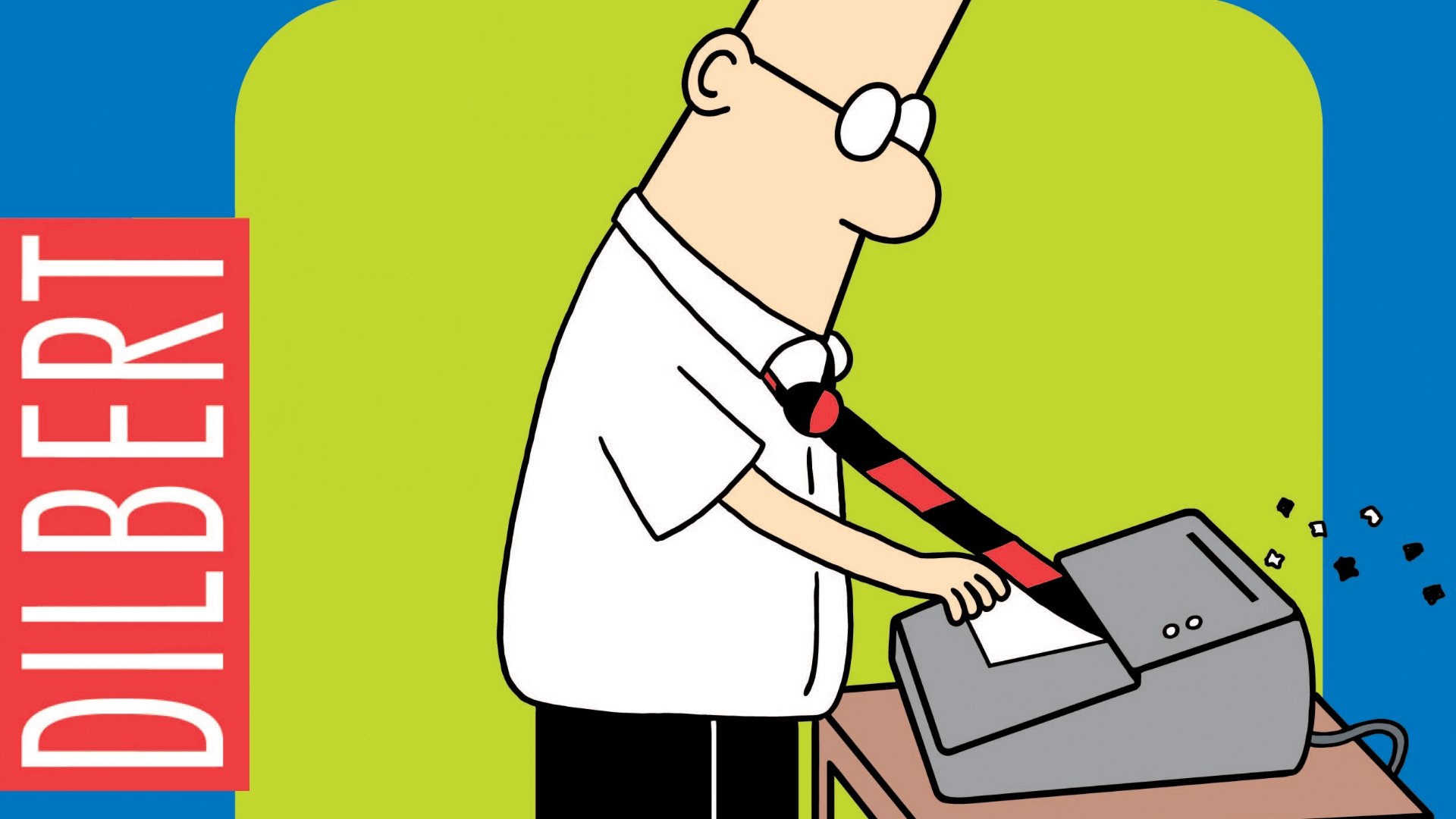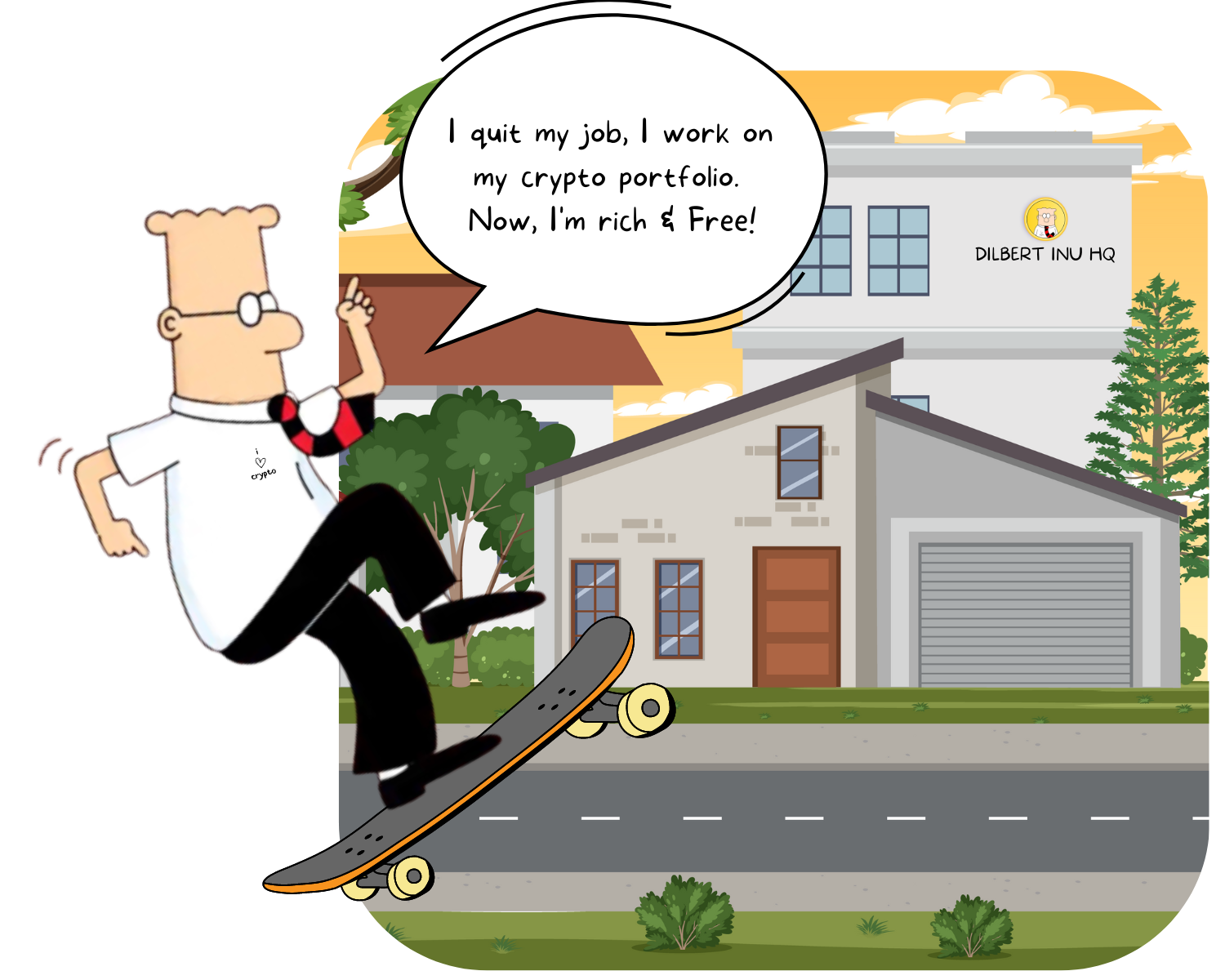So here we are, diving into the world of Dilbert, a cartoon series that's not just about office life but a reflection of the struggles and quirks of the modern workplace. If you've ever felt like your boss is clueless, your projects are pointless, or your meetings are endless, you're not alone. Dilbert captures these moments with humor and wit, turning everyday office frustrations into pure comedy gold. So, let's jump right in and explore why Dilbert has become such a beloved figure in the world of workplace satire.
Now, you might be wondering, what makes Dilbert so special? Well, it's more than just a cartoon. It's a commentary on corporate culture, a mirror to our own experiences, and a reminder that even in the most chaotic office environments, there's always room for laughter. Scott Adams, the genius behind Dilbert, has managed to create a universe where absurdity meets reality, and it's all wrapped up in four-panel strips that hit home in the best possible way.
Let's face it, if you've ever worked in an office, you've probably encountered at least one Dilbert moment. Whether it's dealing with a micromanaging boss, attending meetings that seem to go on forever, or navigating the labyrinth of office politics, Dilbert captures it all. And that's why it resonates so deeply with readers around the world. So, buckle up because we're about to dive deep into the world of Dilbert, and trust me, it's going to be a wild ride.
- The Song The Power Of Love A Journey Through Time And Emotion
- Justin Bieber The Untold Journey Of A Global Superstar
Who is Dilbert Anyway?
In the vast landscape of workplace humor, Dilbert stands out as the quintessential figure of corporate absurdity. But who exactly is Dilbert? At its core, Dilbert is the brainchild of Scott Adams, a former corporate employee turned cartoonist. The character, Dilbert himself, is an engineer who navigates the chaos of office life with a mix of sarcasm and wit. He's the everyman in a world where logic often takes a backseat to bureaucracy, and his daily battles with incompetent management and ridiculous office policies have made him a relatable figure for millions of readers.
A Day in the Life of Dilbert
Picture this: you're stuck in a meeting that could have been an email, your boss just announced a new initiative that makes absolutely no sense, and you're wondering how you ended up in this mess. Sound familiar? That's a typical day in the life of Dilbert. From dealing with Pointy-Haired Boss to interacting with his eccentric colleagues like Wally and Alice, Dilbert's daily adventures are a mix of frustration and hilarity. And let's not forget the Tech Support guy who seems to have a vendetta against all things tech. It's a world where nothing ever goes as planned, and that's what makes it so relatable.
Meet the Creator: Scott Adams
Behind every great cartoon is a great creator, and in the case of Dilbert, that creator is Scott Adams. Before he became a cartoonist, Adams was a corporate employee himself, working in various roles that gave him the perfect material for his future comic strip. His experiences in the corporate world provided the inspiration for Dilbert's humor, and his ability to capture the absurdities of office life has made him a household name. But Scott Adams is more than just a cartoonist; he's also an entrepreneur, author, and speaker, sharing his insights on productivity, creativity, and success.
- What Happened To Axl Roses Voice The Untold Story
- Aries Season 2024 Fire Up Your Life With Astrologys Bold Energy
Scott Adams' Journey to Cartoon Stardom
Scott Adams didn't start out as a cartoonist. In fact, his path to creating Dilbert was anything but straightforward. He worked in various corporate roles, including as a bank teller, loan officer, and product manager, before deciding to pursue his passion for drawing and writing. His early attempts at creating a comic strip were met with rejection, but he persisted, eventually landing a syndication deal that launched Dilbert into the public eye. Today, Adams is not only known for his cartoon but also for his books, speeches, and insights on leadership and innovation.
The Cast of Characters: Who's Who in Dilbert's World
Dilbert's world is populated by a colorful cast of characters, each with their own quirks and idiosyncrasies. There's the ever-sarcastic Dilbert, the incompetent but confident Pointy-Haired Boss, the lazy but clever Wally, and the no-nonsense Alice, just to name a few. Each character brings something unique to the table, contributing to the rich tapestry of humor that makes Dilbert so beloved. Let's take a closer look at some of these characters and what makes them tick.
Pointy-Haired Boss: The Quintessential Corporate Leader
Oh, the Pointy-Haired Boss. Love him or hate him, he's the heart of Dilbert's humor. Representing everything that's wrong with corporate leadership, the Pointy-Haired Boss is clueless, overconfident, and often out of touch with reality. Yet, he's also strangely endearing in his own way, and his missteps often lead to some of the funniest moments in the strip. Whether he's implementing a new policy that makes no sense or trying to motivate his team with bizarre pep talks, the Pointy-Haired Boss is the epitome of corporate absurdity.
Why Dilbert Resonates with Office Workers
There's a reason why Dilbert has become such a phenomenon among office workers. It's not just the humor; it's the relatability. Dilbert captures the essence of office life in a way that resonates with people from all walks of life. Whether you're a manager, an engineer, or a receptionist, there's something in Dilbert that speaks to your experience. It's the shared understanding that sometimes, things just don't make sense, and that's okay. Dilbert gives voice to those unspoken frustrations, turning them into something we can laugh about.
The Universal Language of Office Humor
Humor is a universal language, and Dilbert speaks it fluently. Through its simple yet effective humor, Dilbert has managed to transcend cultural and geographical boundaries, becoming a global phenomenon. It's a testament to the universality of office life and the shared experiences that bind us all together. Whether you're working in a cubicle in New York or a tech startup in Bangalore, Dilbert's humor hits home because it reflects the reality of modern workplace life.
The Impact of Dilbert on Corporate Culture
More than just a cartoon, Dilbert has had a significant impact on corporate culture. It's often credited with bringing attention to the absurdities of office life and encouraging companies to rethink their management practices. By highlighting the flaws in corporate culture, Dilbert has sparked conversations about leadership, innovation, and workplace dynamics. It's a reminder that humor can be a powerful tool for change, and that sometimes, the best way to address a problem is to laugh at it.
Dilbert's Role in Shaping Modern Management
Scott Adams once said that Dilbert is not about making fun of management; it's about making management better. And that's exactly what Dilbert has done. By exposing the flaws in corporate leadership, Dilbert has encouraged managers to rethink their approaches and strive for better communication, transparency, and empathy. It's a call to action for leaders to be more aware of the impact their decisions have on their teams and to create environments where creativity and innovation can thrive.
The Evolution of Dilbert: From Comic Strip to Cultural Icon
Since its debut in 1989, Dilbert has evolved from a simple comic strip to a cultural icon. It's been adapted into books, TV shows, and even merchandise, becoming a staple in offices around the world. Its influence extends beyond entertainment, shaping the way we think about work and leadership. But despite its growth and success, Dilbert has remained true to its roots, continuing to offer a humorous yet insightful look at the world of work.
Adapting to the Changing Workplace
As the workplace has evolved, so too has Dilbert. Scott Adams has kept his creation relevant by addressing contemporary issues such as remote work, diversity, and technology. By staying current, Dilbert continues to resonate with readers, offering commentary on the latest trends and challenges facing the modern workforce. It's a testament to Adams' ability to adapt and innovate, ensuring that Dilbert remains a vital part of workplace culture.
Lessons from Dilbert: What We Can Learn from the Cartoon
While Dilbert is primarily a source of entertainment, it also offers valuable lessons for both employees and managers. From the importance of communication to the dangers of micromanagement, Dilbert provides a wealth of insights into what makes a workplace function effectively. By highlighting the absurdities of office life, Dilbert encourages us to reflect on our own practices and strive for improvement.
Key Takeaways for Managers
- Encourage open communication and transparency
- Avoid micromanaging and trust your team
- Be open to feedback and willing to adapt
- Promote a culture of innovation and creativity
The Future of Dilbert: Where Will It Go Next?
As we look to the future, the question remains: where will Dilbert go next? With the rapid evolution of the workplace, there's no shortage of material for Scott Adams to draw from. From the rise of AI to the changing nature of work itself, Dilbert has the potential to continue offering commentary on the most pressing issues facing the modern workforce. And with Scott Adams at the helm, there's no doubt that Dilbert will remain a relevant and beloved figure in the world of workplace humor.
Adams' Vision for the Future
In interviews, Scott Adams has expressed his excitement about the future of Dilbert and the opportunities it presents. He sees a world where humor and satire can continue to play a vital role in shaping corporate culture and encouraging positive change. With new challenges and opportunities on the horizon, Dilbert is poised to remain a key player in the conversation about work and leadership for years to come.
Conclusion: Why Dilbert Matters
In conclusion, Dilbert is more than just a cartoon; it's a reflection of the world of work and the challenges we all face. Through its humor and insight, Dilbert offers a unique perspective on corporate culture, encouraging us to laugh at the absurdities of office life while also striving for improvement. Whether you're an employee or a manager, Dilbert has something to offer, reminding us that even in the most chaotic environments, there's always room for laughter.
So, the next time you find yourself stuck in a meeting that seems to go on forever or dealing with a micromanaging boss, remember Dilbert. He's been there, done that, and found a way to make it funny. And who knows, maybe by embracing the humor, we can make our own workplaces a little better, one laugh at a time. So, what are you waiting for? Share this article, leave a comment, and let's keep the conversation going!
Table of Contents:
- Who is Dilbert Anyway?
- Meet the Creator: Scott Adams
- The Cast of Characters: Who's Who in Dilbert's World
- Why Dilbert Resonates with Office Workers
- The Impact of Dilbert on Corporate Culture
- The Evolution of Dilbert: From Comic Strip to Cultural Icon
- Lessons from Dilbert: What We Can Learn from the Cartoon
- The Future of Dilbert: Where Will It Go Next?
- Conclusion: Why Dilbert Matters
- Brian Mckenna Hedge Fund Net Worth The Inside Scoop Youve Been Waiting For
- Lindsay Bercosk The Rising Star Whorsquos Making Waves In The Industry


